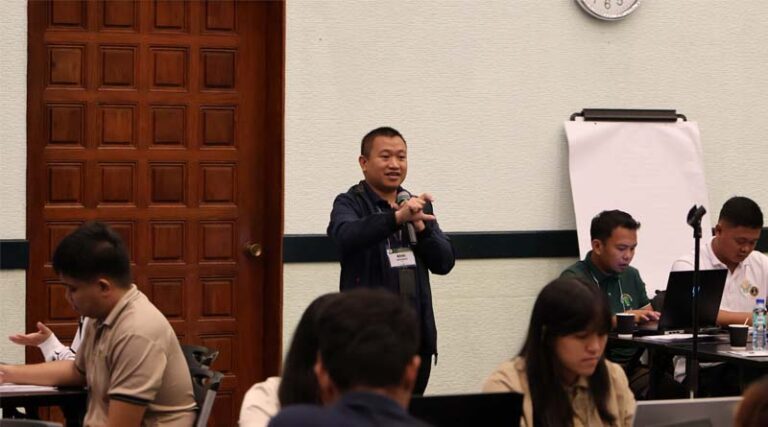
IRRI, DA, and DA-PhilRice Finishes Strong On Its First Year Of Drones4Rice
24 October 2025, Los Baños: The International Rice Research Institute (IRRI), the Philippine Rice Research Institute (PhilRice), and the Department of Agriculture (DA) Regional Field Offices (RFOs) in Cagayan Valley (RFO II), CALABARZON (RFO IVA), and Bicol (RFO V) are gearing up for the second year of the Drones4Rice project, following a successful first year of laying the groundwork for scaling drone technologies in Philippine rice farming. The three-year initiative funded by the Philippine DA – Bureau of Agricultural Research (DA-BAR) aims to boost the productivity and income of smallholder Filipino rice farmers through drone-enabled precision agriculture.
During its first year, the Drones4Rice project team developed protocols for drone-based seeding, pesticide spraying, and fertilizer spreading in partnership with key government agencies such as the Civil Aviation Authority of the Philippines (CAAP), Civil Aeronautics Board (CAB), as well as the DA – Fertilizer and Pesticides Authority (DA-FPA). These protocols were field-tested and validated across the three regions in collaboration with PhilRice and DA. They were also used to support DA’s Drone Voucher Program, which provides Php 2,000 per hectare in assistance to encourage farmers to access drone services.
Although drone use in Philippine agriculture is still emerging, its benefits are clear: lower labor costs, faster and more precise field operations, and early detection of pests and diseases through aerial mapping. With labor accounting for nearly one-third of rice production costs, drone-based direct seeding offers economic and environmental gains—including lower emissions and reduced drudgery.
“By integrating digital tools, we are able to optimize resource management, make faster and more informed decisions, and respond to the needs of farmers more efficiently,” DA Undersecretary for Rice Industry Development Christopher Morales stated in his opening remarks, “For farmers, this translates into practical benefits of more efficient input use, reduced labor costs, and improved crop management,” he continued.
IRRI Project Leader Dr. Carlito Balingbing noted the importance of private sector partnerships in accelerating adoption, “Agridom and NewHope, which are drone service provider companies, assisted in the conduct of field operations and field trials.” NewHope Corporation and Agridom Solutions Corp. have forged formal partnerships with IRRI in the past years to advocate for a modernized and digitalized Philippine agriculture. PhilRice Project Leader Dr. Jasper Tallada also highlighted that promoting digital transformation is a part of their effort to invite more young Filipinos to engage and participate in agriculture.
In its second year, the project will refine fertilizer and pesticide application guidelines, expand pilot testing with DA partners, and continue capacity-building for local implementers. A financial and economic cost analysis will assess the viability of drone services for farmers. The focus remains on generating solid evidence and practical standards to ensure that drones deliver real value at the field level—not just technological promise.
“In line with IRRI’s 2025-2030 strategy, IRRI remains fully committed to ensuring that precision agriculture, especially the use of drones, becomes accessible, inclusive, and scalable for all farmers,” IRRI Deputy Director General – Philippine Representative Dr. Junel Soriano stated. “Together, let us continue to push the boundaries of innovations so that Filipino farmers can benefit from a smarter and more resilient rice industry,” he continued.
📢 If You’re in Agriculture, Make Sure the Right People Hear Your Story.
From product launches to strategic announcements, Global Agriculture offers unmatched visibility across international agri-business markets. Connect with us at pr@global-agriculture.com to explore editorial and advertising opportunities that reach the right audience, worldwide.






